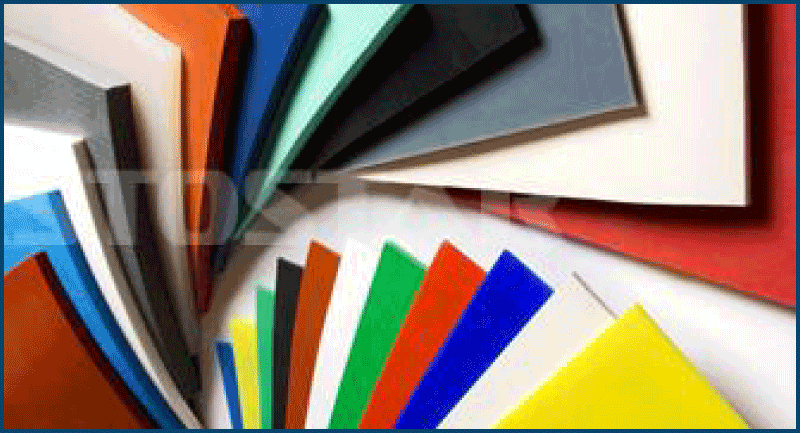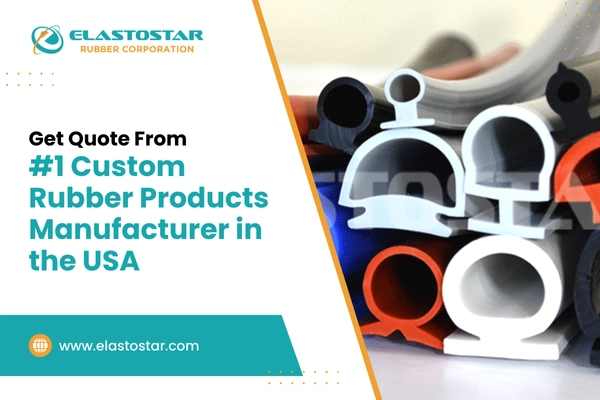Have you ever wondered what makes rubber sheets essential across various industries? Their versatility and durability make them a go-to material for countless applications, from sealing and insulation to protection and vibration damping.
Whether in the automotive, construction, or manufacturing sectors, choosing the right rubber sheet material is crucial for the success of your project. At Elastostar Rubber Corporation, we offer high-quality, customizable rubber sheets designed to meet the specific demands of your application, ensuring reliability and performance every time.
In this blog, we’ll explore the different types, uses, features, and benefits of rubber sheets, guiding you to make the best choice for your next project.
Table of Contents
What Are the Different Types of Rubber Sheets?
Rubber sheets come in various types, each offering unique properties suited to different applications.
Understanding the differences between natural, synthetic, and specialty rubber sheets will help you choose the best option for your specific needs.
Natural Rubber Sheets
Natural rubber sheets are known for their excellent flexibility and resilience, making them perfect for a variety of applications where durability is key. Whether you’re looking to create effective seals or reduce vibration in machinery, natural rubber is a reliable choice. For even more elasticity, latex sheet material is often the go-to option, especially in applications requiring a high level of stretch and flexibility.
Synthetic Rubber Sheets
Synthetic rubber sheets are designed to meet specific needs, offering a range of properties that make them ideal for various environments.
- EPDM Rubber Sheets: These materials offer excellent weather resistance, making them perfect for outdoor applications.They provide the durability needed to withstand harsh conditions.
- Neoprene Rubber Sheets: Neoprene offers a great balance between chemical resistance and flexibility. It’s a popular choice for extruded gaskets and insulation, especially when thick rubber sheets are needed to handle more demanding conditions.
- Silicone Rubber Sheets: Known for their ability to withstand high temperatures, silicone rubber sheets are often used in the medical and food industries, as well as in electronic applications where stability is crucial.
- Nitrile Rubber Sheets: If your project involves exposure to oils and fuels, nitrile rubber sheets are the way to go. Their superior oil resistance makes them perfect for automotive and industrial uses.

Specialty Rubber Sheets
For more demanding environments, specialty rubber sheets are available in two forms.
- Viton Rubber Sheets: If you need a material that can withstand extreme conditions, Viton is your answer. These sheets offer exceptional resistance to chemicals, heat, and oil, making them a top choice for industrial applications.
- Butyl Rubber Sheets: Butyl rubber is known for its low permeability to gases and excellent chemical resistance.These sheets of rubber are ideal when durability and a strong barrier against gases are required.
This comparison will guide you in selecting the right rubber sheet for your specific needs.
| Type of Rubber Sheet | Durability | Flexibility | Chemical Resistance | Temperature Resistance |
| Natural Rubber | High | Very High | Moderate | Low |
| EPDM | High | High | High | High |
| Neoprene | Moderate | High | High | Moderate |
| Silicone | Moderate | High | Moderate | Very High |
| Nitrile | High | Moderate | Very High | Moderate |
| Viton | Very High | High | Very High | Very High |
| Butyl | High | Moderate | Very High | High |
What are the best Applications of Rubber Sheets?
Rubber sheets are highly versatile and are used in a variety of industries. From industrial to commercial and specialized applications.
- Industrial Applications:
In industrial settings, rubber sheets are crucial for sealing, insulation, and vibration dampening. The rubber sheet thickness is vital in ensuring durability and effectiveness in industries like automotive, aerospace, and construction. For example, EPDM rubber sheets are commonly used for automotive seals because of their excellent resistance to UV and harsh environmental conditions. - Commercial Applications:
Rubber sheets are also popular in commercial environments, where they are used for flooring, matting, and DIY projects. Thick rubber sheets provide durability and slip resistance in areas like gyms and workshops, making them a preferred choice for flooring solutions. - Specialized Applications:
In more specialized applications, rubber sheets are fabricated into gaskets, protective pads, and custom components. Thin rubber sheeting is often used in delicate tasks where precision is required, making it ideal for use in electronics, medical devices, and other niche industries.
What are top features of Rubber Sheets?
Rubber sheets are known for their versatility and reliability across a variety of applications.
- Durability and Flexibility
Rubber sheet materials are designed to withstand tough conditions while maintaining flexibility. This makes them ideal for use in environments where they need to endure stress and pressure without losing their shape or effectiveness. Whether it’s sheeting rubber for industrial machinery or construction projects, the combination of durability and flexibility ensures long-lasting performance. - Resistance to Elements
One of the standout features of sheets of rubber is their ability to resist environmental factors such as chemicals, UV rays, and extreme temperatures. This resistance makes them suitable for both indoor and outdoor applications. - Customizability
Rubber sheets can be customized to meet specific needs, including different thicknesses, textures, or sizes. At Elastostar, we provide customized Rubber solutions to match the unique requirements of your project, ensuring you get the right type of rubber for optimal performance.
To assist in choosing the right rubber sheet for your needs, here’s a table comparing the resistance levels of different rubber sheets to environmental factors like UV rays, chemicals, and extreme temperatures.
| Type of Rubber Sheet | UV Resistance | Chemical Resistance | Temperature Resistance |
| Natural Rubber | Moderate | Low | Low |
| EPDM | High | High | High |
| Neoprene | Moderate | High | Moderate |
| Silicone | High | Moderate | Very High |
| Nitrile | Low | Very High | Moderate |
| Viton | Very High | Very High | Very High |
| Butyl | High | High | High |
What Are the Benefits of Using Rubber Sheets?
Rubber sheets offer numerous advantages that make them a valuable material across various industries.
- Versatility
One of the greatest strengths of rubber sheets is their versatility. They are used across a wide range of industries, from automotive to construction, and can be adapted to meet various needs. Whether it’s sealing, insulating, or protecting equipment, sheets of rubber are flexible enough to serve multiple purposes, making them an essential material in many sectors. - Environmental Impact
Rubber sheets also offer environmental benefits. Many rubber sheets are recyclable and can be produced using eco-friendly methods. This sustainability aspect makes them an excellent choice for companies looking to reduce their environmental footprint. - Cost-Effectiveness
Rubber sheets are a cost-effective solution in the long run, particularly in industrial applications. Their durability means they last longer, reducing the need for frequent replacements. This longevity translates to significant cost savings over time, especially in environments where wear and tear are common. By investing in high-quality rubber sheet materials, businesses can avoid the ongoing costs associated with less durable alternatives.
While rubber sheets offer many advantages, there are also some drawbacks to consider.
One potential disadvantage is that certain sheeting rubber materials can degrade when exposed to extreme conditions, such as high temperatures, UV rays, or harsh chemicals, if not properly selected. Additionally, some types of rubber sheets may have limited resistance to oils and fuels, making them unsuitable for specific applications. Over time, rubber sheets can also harden, crack, or lose flexibility, particularly in environments with fluctuating temperatures or exposure to ozone.
| Industry | Properties | Key Advantage |
| Automotive | Cost-Effectiveness | Long-lasting, reduces replacement costs |
| Construction | Versatility | Adaptable to various applications |
| Manufacturing | Durability | Withstands wear and tear |
| Environmental | Environmental Impact | Recyclable, eco-friendly production |
How to Choose the Right Rubber Sheet?
Selecting the right rubber sheet involves ensuring it meets specific application requirements.
- Match the sheeting rubber to your project’s needs by considering factors like flexibility, hardness, and durability.
- Consider environmental conditions such as temperature and chemical exposure, which can affect the performance of the rubber sheet.
- If standard options aren’t sufficient, customize rubber sheets in terms of thickness, texture, and size to perfectly fit your requirements.
This approach ensures optimal performance and longevity for your specific application.
Why Choose Elastostar for Your Rubber Sheets?
We are committed to delivering high-quality customized rubber sheets that meet the unique needs of various industries.
- Custom Solutions: We provide Silicone rubber sheets, designed to meet specific industrial and commercial needs. Thus ensuring optimal performance in challenging environments.
- Premium Quality: Our rubber sheets are made from durable materials that offer excellent flexibility and resistance to harsh conditions, making them reliable for long-term use. These high-quality sheets are designed to perform well in various demanding environments, ensuring you get the best results for your application.
- Industry Expertise: With years of experience, we understand the demands of different sectors and deliver products that consistently meet the highest standards of quality and reliability.
Recommended reads
Silicone Rubber: Where It Comes From
Difference Between Silicone Sponge Rubber And Foam Rubber
The Advantages Of Silicone For Rubber Products

Conclusion
Rubber sheets are crucial across many industries, offering durability, flexibility, and resistance to environmental factors. Whether you need them for industrial, commercial, or specialized applications, choosing the right rubber material sheet is key to enhancing performance and extending the life of your projects. By considering the specific needs of your application and the conditions it will face, you can select the most suitable sheets of thin rubber, ensuring long-lasting and successful outcomes.
FAQs
1. What Are the Most Common Types of Rubber Sheets?
There are several types of rubber sheets commonly used across different industries, including EPDM, Neoprene, Silicone, and Viton. Each type is suited for specific applications based on its unique properties. We at Elastostar, offer a range of these high-quality rubber sheets, ensuring you have the right material for your specific needs.
2. How Do I Choose the Right Sheeting Rubber for My Application?
Choosing the right sheets of rubber involves considering factors such as the operating environment, exposure to chemicals, and the required flexibility. For high-temperature applications, Extruded Silicone might be the best choice, while EPDM is preferred for outdoor environments due to its excellent weather resistance.
3. Are Rubber Sheets Resistant to Chemicals and Extreme Temperatures?
Yes, many rubber sheets, like those made from Viton and Silicone, offer excellent resistance to chemicals and extreme temperatures. These properties make them suitable for use in harsh environments where durability is crucial.
4. Can Rubber Sheets Be Customized to Meet Specific Requirements?
Yes, rubber sheet materials can be customized in terms of thickness, size, and surface texture to meet specific needs. At Elastostar Rubber Corporation, we ensure the rubber sheet you choose perfectly matches your application requirements, providing optimal performance.
5. How Long Do Rubber Sheets Typically Last in Industrial Applications?
The lifespan of Natural rubber sheets in industrial applications varies depending on the type of rubber and the conditions it’s exposed to. Viton and EPDM rubber sheets, for example, are known for their long-lasting performance in demanding environments, ensuring reliable service over time.



